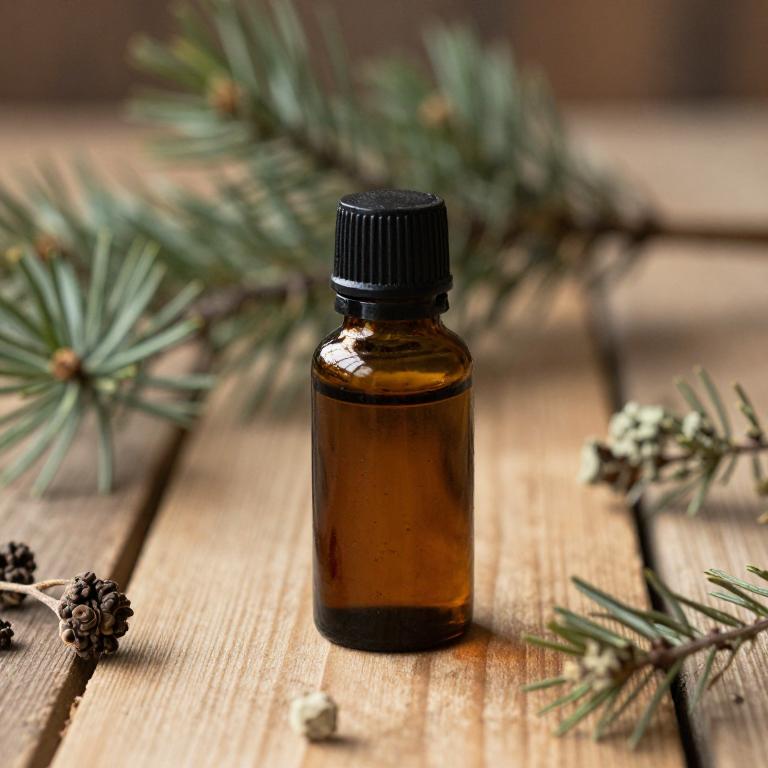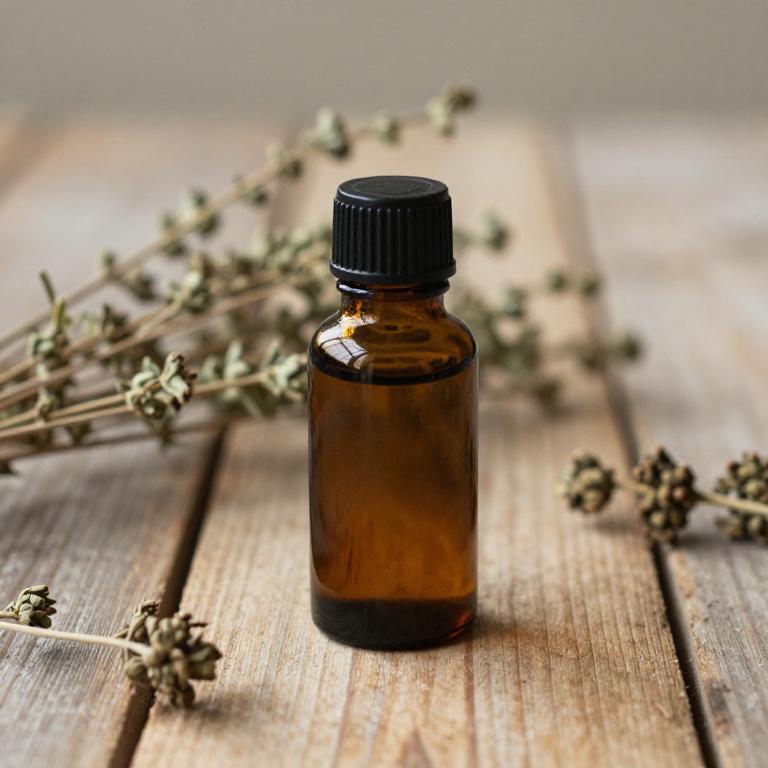10 Best Herbal Essential Oils For Pertussis

Herbal essential oils have been explored as potential complementary treatments for pertussis, a highly contagious respiratory infection caused by the bacterium Bordetella pertussis.
Oils such as eucalyptus, lavender, and peppermint are often used for their antimicrobial and anti-inflammatory properties, which may help alleviate symptoms like coughing and congestion. While some studies suggest that certain essential oils might inhibit bacterial growth, there is limited scientific evidence supporting their effectiveness in treating pertussis specifically. It is important to note that essential oils should not replace conventional medical treatments, as pertussis can lead to severe complications, especially in infants and young children.
Always consult a healthcare professional before using any alternative therapies for infectious diseases.
Table of Contents
- 1. Thyme (Thymus vulgaris)
- 2. Eucalyptus (Eucalyptus globulus)
- 3. Scots pine (Pinus sylvestris)
- 4. English lavender (Lavandula angustifolia)
- 5. Ginger (Zingiber officinale)
- 6. Ceylon cinnamon (Cinnamomum zeylanicum)
- 7. Melaleuca (Melaleuca alternifolia)
- 8. Oregano (Origanum vulgare)
- 9. Rosemary (Rosmarinus officinalis)
- 10. Peppermint (Mentha piperita)
1. Thyme (Thymus vulgaris)

Thymus vulgaris, commonly known as thyme, is a herb that has been traditionally used for its antimicrobial and antispasmodic properties, making it a potential candidate for the treatment of pertussis, or whooping cough.
The essential oil extracted from thyme contains compounds such as thymol and carvacrol, which exhibit strong antibacterial and antiviral activities, helping to combat the causative agent, Bordetella pertussis. While there is limited scientific evidence supporting its direct efficacy against pertussis, some studies suggest that thyme oil may help alleviate respiratory symptoms and reduce the duration of coughing episodes. It is often used in aromatherapy and as a complementary therapy alongside conventional treatments.
However, it is important to consult a healthcare professional before using thyme essential oil for pertussis, as it should not replace standard medical care.
2. Eucalyptus (Eucalyptus globulus)

Eucalyptus globulus, commonly known as the Australian eucalyptus, is a species widely used for its essential oil, which contains compounds like cineole and limonene.
This essential oil has been studied for its potential antimicrobial and anti-inflammatory properties, which may support respiratory health. While it is not a substitute for medical treatment, some preliminary research suggests that eucalyptus oil may help alleviate symptoms of pertussis by reducing coughing and mucus production. It is often used in aromatherapy or as a steam inhalation aid to ease respiratory discomfort.
However, it is important to consult a healthcare professional before using eucalyptus oil, especially for individuals with respiratory conditions or during pregnancy.
3. Scots pine (Pinus sylvestris)

Pinus sylvestris, commonly known as the Scots pine, produces a valuable essential oil that has been traditionally used for its aromatic and therapeutic properties.
While there is limited scientific evidence directly supporting its efficacy against pertussis, some studies suggest that the antimicrobial compounds in pine essential oils may have a broad-spectrum effect against respiratory pathogens. The oil contains components such as alpha-pinene and beta-pinene, which possess anti-inflammatory and decongestant properties that could potentially aid in relieving symptoms associated with coughing. However, it is important to note that essential oils should not be used as a substitute for conventional medical treatments for pertussis, and consultation with a healthcare professional is recommended.
Further research is needed to fully understand the potential role of Pinus sylvestris essential oils in managing respiratory infections like pertussis.
4. English lavender (Lavandula angustifolia)

Lavandula angustifolia, commonly known as English lavender, produces an essential oil that has been explored for its potential therapeutic properties, including antimicrobial effects.
Preliminary studies suggest that lavender essential oil may exhibit antibacterial activity against certain pathogens, though its efficacy specifically against Bordetella pertussis, the bacterium responsible for pertussis, remains under investigation. While lavender oil is often used in aromatherapy for its calming and soothing effects, its role in treating or preventing pertussis is not well-established in clinical trials. Some researchers have proposed that its antimicrobial compounds, such as linalyl acetate and linalool, might contribute to its potential use in respiratory infections.
However, due to limited scientific evidence, it is not recommended as a primary treatment for pertussis and should not replace conventional medical therapies.
5. Ginger (Zingiber officinale)

Zingiber officinale, commonly known as ginger, contains essential oils that have been traditionally used for their anti-inflammatory and antimicrobial properties.
These essential oils, derived from the rhizome of the plant, include compounds such as gingerol and shogaol, which exhibit potential therapeutic effects. While there is limited clinical evidence specifically linking zingiber officinale essential oils to the treatment of pertussis, some studies suggest that its bioactive components may help alleviate symptoms such as coughing and inflammation. Due to the lack of robust scientific validation, it is not recommended as a primary treatment for pertussis.
However, it may be used as a complementary therapy under the guidance of a healthcare professional.
6. Ceylon cinnamon (Cinnamomum zeylanicum)

Cinnamomum zeylanicum, commonly known as cinnamon, produces essential oils that have been traditionally used for their antimicrobial and anti-inflammatory properties.
These oils contain compounds such as cinnamaldehyde and eugenol, which exhibit potent activity against various pathogens, including bacteria and viruses. While there is limited direct scientific evidence linking cinnamon essential oils to the treatment of pertussis, some studies suggest that its antimicrobial properties may help in reducing secondary infections associated with the disease. The use of cinnamon oil in aromatherapy or topical applications may support respiratory health, but it should not replace conventional medical treatments for pertussis.
As with any complementary therapy, it is important to consult a healthcare professional before using cinnamon essential oils for therapeutic purposes.
7. Melaleuca (Melaleuca alternifolia)

Melaleuca alternifolia, commonly known as tea tree oil, is a popular essential oil derived from the leaves of the Melaleuca alternifolia plant, native to Australia.
While it is widely recognized for its antimicrobial properties and use in treating skin infections and respiratory conditions, its efficacy in treating pertussis, or whooping cough, remains a topic of debate. Some studies suggest that its antibacterial compounds, such as terpinen-4-ol, may help reduce the severity of respiratory infections by inhibiting the growth of bacteria like Bordetella pertussis. However, there is limited clinical evidence supporting its use as a primary treatment for pertussis, and it is generally recommended as a complementary therapy under medical supervision.
Due to its potential safety profile and lack of strong evidence, melaleuca essential oil should not replace conventional medical treatments for pertussis.
8. Oregano (Origanum vulgare)

Orihanum vulgare, commonly known as oregano, is a medicinal plant whose essential oils have been traditionally used for their antimicrobial properties.
The essential oil of Origanum vulgare contains compounds such as carvacrol and thymol, which exhibit strong antibacterial and antiviral activities. Some preliminary studies suggest that these essential oils may have potential in inhibiting the growth of Bordetella pertussis, the bacterium responsible for pertussis or whooping cough. However, more clinical research is needed to confirm its efficacy as a treatment for pertussis.
While oregano essential oil may support respiratory health, it should not replace conventional medical treatments for this infectious disease.
9. Rosemary (Rosmarinus officinalis)

Rosmarinus officinalis, commonly known as rosemary, contains essential oils that have been explored for their potential therapeutic effects, including antimicrobial properties that may support the treatment of pertussis, or whooping cough.
The primary active compounds in rosemary essential oil, such as camphor, cineole, and pinene, exhibit antibacterial and anti-inflammatory actions, which may help reduce the severity of respiratory infections like pertussis. While rosemary essential oil is not a substitute for conventional medical treatments, some studies suggest it may offer complementary benefits in managing symptoms and supporting immune function. However, it is important to note that there is limited clinical evidence specifically linking rosemary essential oil to the treatment of pertussis, and its use should be discussed with a healthcare professional.
As a natural remedy, rosemary essential oil should be used cautiously, particularly in individuals with respiratory conditions or sensitivities.
10. Peppermint (Mentha piperita)

Mentha piperita, commonly known as peppermint, is a widely used herb whose essential oil has been explored for its potential therapeutic effects, including its possible role in managing symptoms associated with pertussis, or whooping cough.
The essential oil contains potent compounds such as menthol, which may help alleviate respiratory congestion and reduce coughing by acting as a mild bronchodilator and decongestant. While there is limited scientific evidence directly linking peppermint essential oil to the treatment of pertussis, some traditional and alternative medicine practices suggest it may support respiratory health. Due to its strong aromatic properties, the oil is typically diluted before use, and it is important to consult a healthcare professional before using it as a complementary therapy.
Overall, while peppermint essential oil may offer some symptomatic relief, it should not replace conventional medical treatments for pertussis.